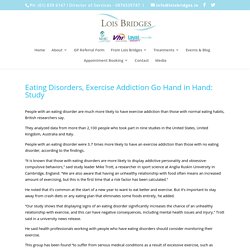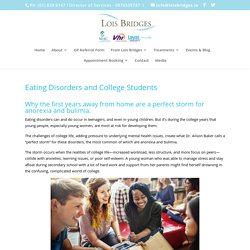

Lois Bridges
Lois Bridges is Ireland’s only dedicated Residential and Day patient care facility solely for treatment of Anorexia, Bulimia and Binge Eating disorders.
Residential Programme - Based on Individual Needs. We pride ourselves in our treatment approach as it involves an attitude of warmth, respect empathy and honesty at all times. The focus of our team is towards gaining an understanding of each individual thus helping to enhance their motivation to accept and deal with their Eating Disorder.
Our team draw upon empirically supported treatment programmes such as the Maudsley Method and we adhere to the NICE Guidelines. Initial assessment is carried out by our Consultant Psychiatrist and Clinical Director. On Completion of assessments the team together with the individual will meet to devise and discuss their treatment plan. The length of our residential program depends upon each individual needs at the time of admission. Our programme is designed to meet the individual needs of the client and their family and incorporates the following therapies. Outpatient programme - Keep other commitments. Understanding Eating Disorders & Finding Their Cure.
Eating disorders are serious, biologically influenced illnesses.

If left untreated, eating disorders have a devastating impact on affected individuals and their loved ones. Full recovery from an eating disorder is possible. Learning more about the causes of eating disorders, different types of disordered eating, and recognising the damage caused by common myths and misconceptions regarding eating disorders will help you start to understand what’s going on with your loved one and put you in a position to help them recover. Many people believe eating disorders are simply a case of a diet taken too far. It is now known that although cultural and environmental factors have an impact, genetics play a significant role.
Specialists now recognise that in vulnerable individuals an eating disorder is usually triggered by a period of the body receiving inadequate nutrition. Eating Disorder Treatment Centre in Dublin Ireland. Eating Disorder Treatment Centre in Dublin Ireland. Eating Disorders, Exercise Addiction Go Hand in Hand: Study. People with an eating disorder are much more likely to have exercise addiction than those with normal eating habits, British researchers say.

They analyzed data from more than 2,100 people who took part in nine studies in the United States, United Kingdom, Australia and Italy. People with an eating disorder were 3.7 times more likely to have an exercise addiction than those with no eating disorder, according to the findings. “It is known that those with eating disorders are more likely to display addictive personality and obsessive-compulsive behaviors,” said study leader Mike Trott, a researcher in sport science at Anglia Ruskin University in Cambridge, England.
“We are also aware that having an unhealthy relationship with food often means an increased amount of exercising, but this is the first time that a risk factor has been calculated.” Male Bulimia Treatment Ireland l Eating Disorder Treatment. Andrew “Freddie” Flintoff will recount his experience of bulimia in a personal documentary for BBC One.

The former cricketer and Top Gear host, 42, developed the eating disorder after joining the England side, prompted by scrutiny from fans, the press and his colleagues. Freddie Flintoff On Bulimia will see him meet experts and male sufferers with the aim of developing a better understanding of what it means to be a man with an eating disorder. He said: “If this resonates with one person watching, or through this we can show someone that there is help out there, then this is worth doing.” Eating Disorder Treatment Centre in Ireland. Eating Disorder Family Treatment Ireland l Anorexia Bulimia Treatment. Treatment of Anorexia, Bulimia and Binge Eating Disorders in Dublin. Learning About Eating Disorder Treatment. What is Day Patient Program? Any resident can be referred to the day program or following a referral from their GP.
It can also be provided as an alternative to residential care. Clients who participate in our day program engage fully in treatment at Lois Bridges. This program runs 5 days a week. That means a person can live at home while undergoing treatment and continue to go to work or college. People who have stopped work or college may slowly return to their job or studies during their treatment depending on their situation.
Our day program runs from 10.00am- 17.00pm with the option of participating in a minimum of 3 days up to the full 5 days. Our day program offers a mix of: Group TherapyMeal SupportIndividual TherapyDietetic CounsellingCognitive Behavioral Therapy EnhancedDialectical Behavioral TherapyMotivational Enhancement TherapyExpressive mind and body therapies (Art, dance, music, yoga, meditation, tai chi)Guided Imagery TherapyCompassion Focused Therapy. Understanding Eating Disorder. Eating Disorders and College Students. Why the first years away from home are a perfect storm for anorexia and bulimia.

Eating disorders can and do occur in teenagers, and even in young children. But it’s during the college years that young people, especially young women, are most at risk for developing them. The challenges of college life, adding pressure to underlying mental health issues, create what Dr. Alison Baker calls a “perfect storm” for these disorders, the most common of which are anorexia and bulimia. The storm occurs when the realities of college life—increased workload, less structure, and more focus on peers—collide with anxieties, learning issues, or poor self-esteem. What lies beneath: The difficulty of facing up to an eating disorder. Irish Times Article, August 2018 It’s damaging to have too strict a definition of an eating disorder.

So says Molly Twomey, a 22-year-old student who has blogged about her experience of having an eating disorder. Eating Disorder Treatment for Older Women Ireland. By Gilian Havey, Freeland Writer As the cookie crumbles in my mouth, delivering a shot of much-needed sugar, a sudden urge flashes across my mind.

I am tempted to grab another, and another, before dashing to the loo to purge. Stilling myself, I engage rationally with my feelings and manage to move on without giving in. I’m not always so successful. As a mother of five, and at 38 years of age, I’m under no illusions: I know I’m never going to be strutting down the catwalk; time has taken its toll on my once toned body and I’ve been through four stressful pregnancies. I'm a man and I have an eating disorder. That's not a contradiction - Lois Bridges. By John Paul Brammer I don’t remember the first time I purged.

I remember it being a habit, a nightly ritual. I remember the pattern of the bathroom tiles in my parents’ house. Lois Bridges - Eating Disorder Clinic for Anorexia. “Even though a person suffering hates the eating disorder, it’s still the one thing in the world that makes us feel safe like a child that has a security blanket” Amanda Lynch was diagnosed with Anorexia Nervosa eight years ago.

The Dublin womans’ condition escalated so quickly, it cost her her dream career. Looking back, Amanda admits to spending most of her teens comparing herself to other girls bodies believing she was fat. She soon began buying diet pills online to try and lose weight, something which she now regrets. She told RSVP Live: “I know now how dangerous this was because I had no idea what was in them, they would make my heart race. Free Support Groups - Eating Disorder Self Care and Family and Friends. Lois Bridges Eating Disorder Support & Self Care Groups offer a space for people to talk openly about their Eating Disorder and co-existing conditions eg low mood, depression, anxiety, OCD and their impact on the persons life.

Peers share their experience and understanding and offer an exchange of thoughts and techniques around self-care and resilience in a supportive, confidential and proactive environment. Lois Bridges family and friends support Groups. Eating Disorder Treatment Ireland l After Care Eating Disorder Treatment. Residential Eating Disorder Treatment Ireland l Anorexia Bulimia. 15 ways to help someone with an Eating Disorder. 1.

Communicate Concern If you’re worried that a loved one may have an eating disorder, educate yourself on the tell-tale signs. These include skipping meals, going to the bathroom after meals, over-eating to the point of sickness or engaging in an increased level of exercise to burn off food. Psychological changes can include mood fluctuations, relationship difficulties and social withdrawal. Physical changes may include weight loss, fatigue and loss of menstrual cycle. 2. Gently let the person know you’re concerned and describe specifically what you have observed that has caused your concern.
It’s important to accept that the person needs to acknowledge the problem and ultimately make the decision to move toward recovery. If the person doesn’t accept that there’s a problem, try not to be disheartened. It’s also a good idea to leave relevant written information around for the person to read. 3. Explain that you understand that whatever they’re doing helps them feel safe. 4. 5. 6. 7. 8. 9. Eating Disorder Treatment Day Programme Ireland. Social Media and its Effect on Eating Disorders. Social media has effectively made its way into every classroom, dinner table, and workplace.
Whether it is used by children, teenagers, or adults, everyone seems to have a huge presence in the social media world. With a wide range of social media platforms used among all age groups including Instagram, Facebook, Snapchat, and Twitter, it can be increasingly difficult to escape the pressures and influences of social media. Social media may have a strong influence on a person’s relationship with food and fear of gaining weight. Many individuals in the social media world are chronicling their fit bodies, food choices, and exercise regimes. For individuals struggling with an eating disorder, the constant streams of body and food conscious posts may cause heightened levels of stress and anxiety surrounding the ‘perfect body image’.
Helping Someone with an Eating Disorder - Lois Bridges. Are you worried that someone you know has an eating disorder? These tips can help you offer support to your child, family member, or friend. Many people worry about their weight, what they eat, and how they look. This is especially true for teenagers and young adults, who face extra pressure to fit in and look attractive at a time when their bodies are changing.
As a result, it can be challenging to tell the difference between an eating disorder and normal self-consciousness, weight concerns, or dieting. Further complicating matters, people with an eating disorder will often go to great lengths to hide the problem. New Mayo concerns over rise in eating disorders. A Mayo Oireachtas member has voiced her concerns over data published by the child and adolescent psychiatry surveillance system. The shock report revealed that up to 4,000 children and adolescents in Ireland between the ages of eight to 17 may be suffering from anorexia nervosa.
Senator Michelle Mulherin said the figures have doubled since 2006. Senator Michelle Mulherin. Eating Disorders Middle Aged Women. Book Lois Bridges Appointment Online. Renowned Anorexia Treatment Center in Dublin. The effect that Eating Disorders have on families and loved ones can be destructive. Relationships can become strained and compromised, usually this can be due to a lack of understanding around the illness. Best Anorexia Treatment for Adults in Dublin.